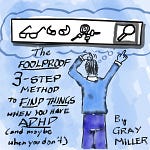TRANSCRIPT OF PODCAST
“Hang on a minute,” my coworker said through the zoom. “I need to take care of this now, or it won’t get done.”
I nodded and sat back in my office chair. “I get it. Let me know when you’re done.”
The task was small, tedious, and crucial to the success of our upcoming fundraising campaign for the rape crisis center where we work. I’d mentioned it in passing as we were covering a different topic.
Now it had interrupted the flow of the meeting, not even a third of the way down the agenda. As I doodled in my notebook, listening to the clicks of them typing through my laptop speaker, I wasn’t annoyed at all. Like me, my coworker deals with ADHD every moment of every day.
Unlike me, they’ve known about it for most of their professional life, and this was how they compensated for time blindness: when a task was essential, it took priority, because they couldn’t trust their brain to take care of it later.
That method worked for them; they are very good at their job. My own coping strategy had unconsciously developed decades ago, before I really even knew about ADHD in anyone. It takes the form of the little notebook I carry with me almost everywhere, full of little dashes for tasks needing to be done that turn into plus-signs when complete.
Of course, my system relies on my ability to go back to the notebook on a regular basis and actually review my lists. My coworker, on the other hand, just gets shit done.
I can’t say whose is better, but it occurred to me at that meeting that both of us were trying to deal with the same problem.
No matter when it is, now you are.
“For people with ADHD, life is either Now or Not Now…When projects are due in the future, we engage in temporal discounting: You know you need to get going on it, but there’s no sense of urgency and your mind focuses on other matters until the day before. Temporal discounting is no longer a factor when what was in the future is now.
— Susan Lasky, M.A., BCC, SCAC
If the term “temporal discounting” is new to you (it was to me) it basically goes back to that %$#@ marshmallow experiment.
You know, the one where supposedly a child’s success in the future was determined by whether or not they could resist eating a marshmallow long enough for a second marshmallow to be delivered, or if they succumbed to the immediate gratification of eating it now.
There are all kinds of problems with that study, starting with the fact that in 2018 when researchers tried to replicate it,
…they did not see a significant correlation with how long kids had been able to wait and future success and performance…waiting only the first 20 seconds accounted for the majority of what was predicted about future academic achievement. Waiting longer than 20 seconds didn’t track with greater gains. — Psychology Today
Another issue is that it’s more to do with the confidence in authority figures:if a child doesn’t believe that the promised second marshmallow will ever be delivered, they are likely to go for the arguably smarter idea of one in the mouth is worth two in the nope, sorry, we’re all out of marshmallows.
In some ways it feels like the entire rise of civilization is one marshmallow experiment after another: can you hold on to your resources long enough for them to be leveraged into something more? Take a look at the gleam in a financial planner’s eyes as they talk about the magic of compound interest. If I can keep from spending that money, put it in a savings account and wait, it will be worth more in the end. (I know, high inflation and low interest rates have kind of ruined that idea, but it used to be true).
What if you don’t believe in “the end”? Or at least, can’t really intrinsically understand it? Then that money is just sitting there, doing nothing, and meanwhile the world is filled with stuff that I want!
Mix in a little scarcity mentality, and you end up with a whole lot of paycheck-to-paycheck or, worse, robbing-Peter-to-pay-Paul monetary strategies.
…research, commissioned by the digital bank Monzo and conducted by YouGov, found that those living with ADHD are four times more likely to frequently impulse-spend than those who do not have the condition.
— Rupert Jones in the Guardian, June 2022
Compound interest doesn’t just apply to money.
Temporal discounting is like impulse buying, but with tasks rather than cash.
When you can’t intuitively feel what task should have the highest priority or the most impact, all to-dos seem equal — which means that looking at a long list of them is like being in a supermarket: overwhelming choices, all clamoring for your attention.
My co-worker was not giving in to an ADHD impulse when they decided to do that task in the middle of our meeting. They were using a tactic to counter it; experience had shown that when a task was labeled “important and essential”, the best way to make sure it got done was to do it now. Any other method, for them, was too much of a risk.
My own strategy is demonstrably less effective at getting things done, because it relies on a combination of tactics and what ADHD researchers call “scaffolding.”
What it comes down to — both with financial acumen and task management — is executive function, and that’s what we have trouble with. My personal mantra is a hybrid paraphrasing of Dr. Russell Barkley and fictional Martian astronaut Mark Watney:
Executive function? I’m going to externalize the $#@% out of it!
So when I hear that something is essential, unlike my coworker, I whip out my notebook and my multipen, selecting the red ink, and dash something off: do this later.
But that’s dependent on a lot of things:
I have to have my notebook ready.
I have to have a pen as well (been burned by this before)
I have to write the task both quickly and legibly, which is often a difficult combination.
Most important: I have to have a time set aside to come back to my notebook and process that task.
Oh, and then the task itself has to be actually done. That’s a whole lot of executive functioning going on inside that error-prone system, and if you’re wondering to yourself “why doesn’t he just remember to do it later? then you really need to read this article — or at least understand that time you start a sentence with “why don’t they just-” it is a sign that your empathy needs some work.
My strategy is more fragile than my co-worker’s just do it tactic, but it’s not necessarily better. We both go to the trouble of interrupting our meeting to make sure that the important task that we can’t trust to stay in our brains still gets done. The only slight advantage I can see to my system is that it doesn’t derail the flow of the meeting — but at the same time it’s got a lot of points of failure.
It’s all tactics for the same strategy: escaping the tyranny of Now.
Part of the reason I feel so seen and included now that I have my ADHD diagnosis is that finally my decades-long obsession with time management, scheduling techniques, and productivity hacks makes sense.
While not all ADHD coping strategies are about escaping the tyranny of now, it’s a pretty high percentage. I would even argue that our trouble with time-blindness and the associated effects are the first symptom of ADHD we have to deal with — because otherwise we won’t have time to deal with any of the others.
(Even as I write that, my brain is arguing What about emotional regulation? Don’t you have to be calm enough to take a look at your strategies in the first place? Maybe that’s another article. I’d love to hear your thoughts in the comments).
Most of all, though, while the strategy may be universal, the tactics are personal. It’s not about finding the best productivity system or time-management app; it’s about finding the best one that works for you right now.
And it’s especially important to have those last two words, because thanks to hedonic adaptation and a %$#@-ed up dopamine distribution system, the one that works today might not work tomorrow. There very well may come a meeting when I see my co-worker narrow their eyes, pick up a pen, and scribble something in their notebook, even while I’m opening up another window next to Zoom to take care of something now.
It’s ok. We’ll still get %$#@ done.













Share this post